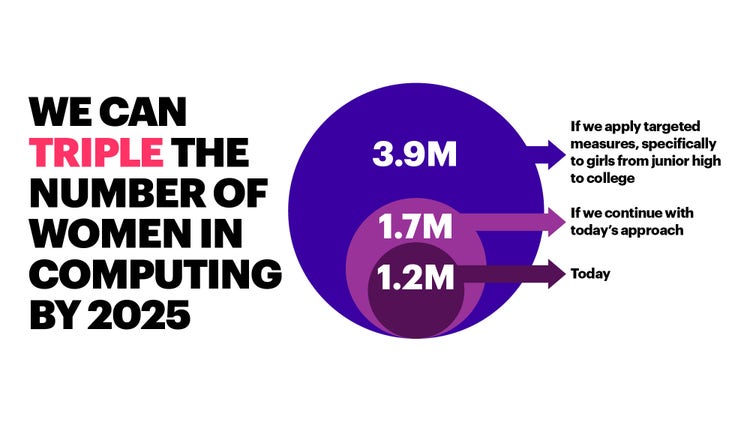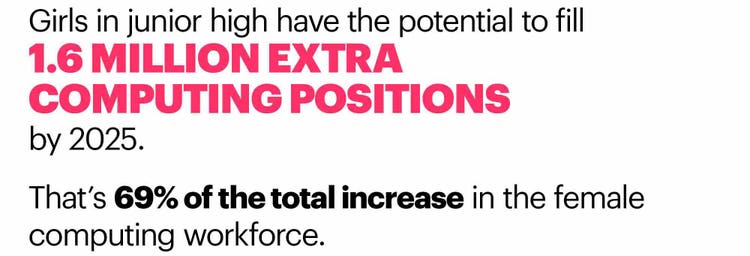October 20, 2016
Women’s Share of U.S. Computing Workforce Declining, but Interventions Could Triple the Pipeline by 2025, According to Research from Accenture and Girls Who Code
NEW YORK; Oct. 20, 2016 – The share of women in the U.S. computing workforce will decline from 24 percent to 22 percent by 2025, according to new research from Accenture and Girls Who Code. But interventions to encourage girls to pursue a computer science education could triple the number of women in computing to 3.9 million, growing their share of technology jobs from 24 percent today to 39 percent in the same timeframe.
Cracking the Gender Code measured how the factors influencing girls’ pursuit of computer sciences change at each stage of their education and recommends a more tailored and sequenced series of actions starting in junior high school and sustained through high school and college. These actions could not only increase the pipeline of women to 3.9 million by 2025, but also boost women’s cumulative earnings by $299 billion.

https://www.accenture.com/us-en/cracking-the-gender-code
“Despite unprecedented attention and momentum behind the push for universal computer science education, the gender gap in computing is getting worse,” said Reshma Saujani, founder and CEO of Girls Who Code. "The message is clear: a one-size-fits-all model won’t work. This report is a rallying cry to invest in programs and curricula designed specifically for girls. We need a new mindset and willingness to prioritize and focus on our nation’s girls, and we need it now.”
The demand for computing skills far outstrips supply, plaguing U.S. employers with a talent shortage. In 2015, there were more than 500,000 open computing jobs to be filled in the U.S. but fewer than 40,000 new computer science graduates to fill them. The untapped potential of women to fill these roles has vast implications for U.S competitiveness.

https://www.accenture.com/us-en/cracking-the-gender-code
“Dramatically increasing the number of women in computing is critical to closing the computer science skills gap facing every business in today’s digital economy,” said Julie Sweet, Accenture’s group chief executive – North America. “Without action, we risk leaving a large portion of our country’s talent on the sidelines of the high-value computing jobs that are key to U.S. innovation and competitiveness.”
Paul Daugherty, Accenture’s chief technology officer, added, “Current workforce projections are troubling and demand a new strategy to encourage more girls to pursue technology careers. We must inspire girls at every stage – from the first time they put a mobile phone in their hands to when they graduate college – to believe that they can create the next big thing and help change the world in the process.”

https://www.accenture.com/us-en/cracking-the-gender-code
Recommendations for Cracking the Gender Code
The research included a large-scale survey of girls aged 12-18, undergraduate college students, and key influencers to understand the state of girls’ interest in computing at each stage of their education. Using the survey findings, the research identified actions to reversing the projected decline of women in technology, including:
- Spark interest in junior high. Today’s junior high school girls have the potential to fill 1.6 million extra computing positions by 2025 – twice the potential of high school and college girls combined. Greater guidance from parents and teachers can show girls that computing is cool, fun and a means to realize their aspirations, not just a pursuit for boys. One recommendation: Boosting girls’ hands-on experience through computer games specifically designed for girls.
- Sustain engagement in high school. The high school years tend to be a time of high risk, where girls fall into the “high school trap,” losing interest in computing and never returning. Among the interventions is summer camp where girls study computing with their female friends. The research found that 81 percent of high school girls who studied computing over the summer were interested in studying it at college, compared to 52 percent who only studied computing at school.
- Inspire a career after college. While the college years are critical to exposing women to career opportunities, the research found that the door to computing never closes, as girls can learn computer science skills post-college even if they’ve had no previous formal education. In fact, more than half the women working in computing profiled in the research didn’t major in computer science in college. One recommendation: Offer all undergraduates, not just computing/tech majors, on-campus and summer immersion programs in computing/coding.
Methodology
Accenture and Girls Who Code carried out in-depth ethnographies and focus groups to identify issues, drivers, barriers and perceptions among girls aged 12-18, undergraduates, young workers, parents and teachers. Using the findings of the qualitative study, we then interviewed more than 8,000 individuals to validate and quantify those results.
About Accenture
Accenture is a leading global professional services company, providing a broad range of services and solutions in strategy, consulting, digital, technology and operations. Combining unmatched experience and specialized skills across more than 40 industries and all business functions – underpinned by the world’s largest delivery network – Accenture works at the intersection of business and technology to help clients improve their performance and create sustainable value for their stakeholders. With approximately 384,000 people serving clients in more than 120 countries, Accenture drives innovation to improve the way the world works and lives. Visit us at www.accenture.com.
About Girls Who Code:
Girls Who Code is a national non-profit organization working to close the gender gap in technology. Through its Summer Immersion Program and Girls Who Code Clubs, the organization is leading the movement to inspire, educate, and equip young women with the computing skills to pursue 21st century opportunities. Additional information is available at www.girlswhocode.com.
# # #
Contact:
Stacey Jones
Accenture
+ 1 917 452 6561
[email protected]
Rachel Frey
Accenture\
- 1 917 452 4421
[email protected]
Deborah Singer
Girls Who Code
+ 1 314 762 7477
[email protected]